BITS BLOG
What Your IT Provider Isn’t Telling You About Cybersecurity
And why that silence could be putting your business at risk
Most small and mid-sized businesses rely on a managed IT provider to keep things running smoothly. They handle tickets, updates, backups, and software installs. For that, they are essential.
But here is the problem: most IT providers are not security providers.
They may offer antivirus, patch management, or a firewall license as part of your service plan, but that does not mean your business is secure. In fact, many providers do not mention the real gaps in your security program because those gaps fall outside their responsibility. They avoid raising concerns that may complicate the relationship.
In this article, we explain what most IT providers will not tell you about your cybersecurity risk, and what you should be asking if you want real protection.
The Hidden Divide: IT vs. Cybersecurity
Here is the truth that many business leaders do not realize:
IT is not the same as cybersecurity.
IT focuses on uptime, usability, and functionality. Cybersecurity focuses on risk, resilience, and defense.
Good IT ensures your systems are accessible.
Good cybersecurity ensures your systems remain protected when something goes wrong.
Most MSPs are excellent at operations and user support. But when it comes to:
- Threat detection and response
- Access governance
- Vendor risk management
- Incident response planning
- Regulatory compliance
They either do not provide these services or depend on third-party vendors, and they rarely bring it up unless you ask.
What They’re Not Telling You
1. “Your MFA isn’t enforced everywhere.”
Your IT provider may have helped set up multi-factor authentication. But is it applied across every application, admin account, and remote access point?
In many cases, the answer is no, and that leaves your business open to attack.
2. “You’re responsible for security settings in the cloud.”
Platforms like Microsoft 365 and Google Workspace have hundreds of configuration options. Most IT providers turn on just enough to get you operational.
Misconfigurations are now one of the top causes of cloud data breaches. Many businesses are not aware of what protections are missing.
3. “We don’t handle compliance documentation.”
If your insurance carrier or client asks for an incident response plan, data protection policy, or user access review logs, your IT provider may not have them.
Claims and audits often fail because businesses assume someone else has this information covered.
4. “We don’t monitor for advanced threats.”
Basic antivirus and firewall alerts are not enough anymore. Today’s threats use identity theft, fileless malware, and social engineering to bypass these systems.
If your provider is not offering MDR or 24/7 threat detection, then you are not protected when it matters most.
5. “We focus on support. You need someone focused on risk.”
Your IT provider is great at helping users troubleshoot problems and keeping systems running. That is valuable. But it is not the same as building a cybersecurity program tied to business strategy and risk.
What You Should Ask Instead
To move from basic IT coverage to real cybersecurity, ask:
- Who owns our cybersecurity strategy?
- Do we have full visibility into users, devices, and apps?
- Are we monitoring for threats outside of business hours?
- Can we produce documentation for audits or insurance requests?
- If we are breached, who leads the response?
If your provider cannot answer these questions clearly, it may be time to bring in a dedicated security advisor.
How BITS Cyber Fills the Gap
BITS Cyber partners with your existing IT provider or internal team to:
- Build a business-aligned security roadmap
- Define clear responsibilities between IT and security
- Uncover risk through structured assessments
- Translate compliance into practical controls
- Prepare your business for growth, audits, and change
We do not replace your IT team. We help you strengthen what they cannot fully address.
Final Thought
You cannot outsource accountability.
Your IT provider plays a key role. But cybersecurity is broader than password resets and patch schedules. If no one is watching risk, then your business is exposed.
BITS Cyber helps you build a proactive security program that aligns with your business goals.
Because real protection is not accidental, it is strategic.
